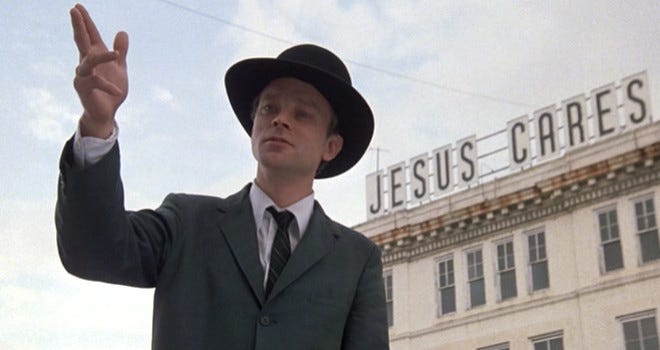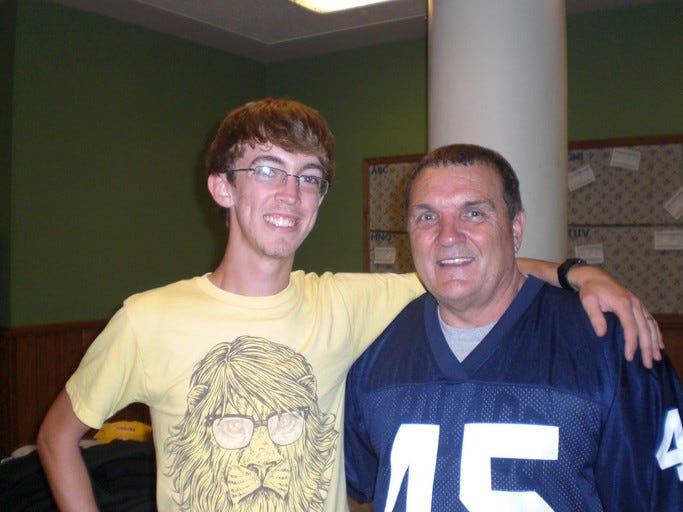I was a sidewalk preacher
I lost my nerve for proselytizing. Does that make me less of a Christian?
“Do you have a minute to talk about the Four Spiritual Laws? Do you have a minute to talk about the Four Spiritual Laws? Do you have a minute to talk about the Four Spiritual Laws?”
I don’t know how you spent the summer of 2008, but I spent part of it saying that to strangers on a busy sidewalk in Chicago with a thick stack of gospel tracts in my hand.
Friends, I can tell you this: Nobody had a minute to talk about the Four Spiritual Laws.
I was 19 years old, partway through college, and “wrestling with God” as we said in those days. As I struggled to understand my own relationship with the divine, I was simultaneously on a mission to bring new souls into the fold. We kept a tally of our wins and losses on a wall in the dorm where we stayed that summer.
Back in high school, I briefly entertained the notion of attending Jerry Falwell’s evangelical stronghold Liberty University but eventually decided to take my chances at the big state university in Columbia instead.
And I got there and found out that even in this den of liberal indoctrination, evangelical Christian culture was still a very big deal. I joined an unfortunately named student ministry called Campus Crusade for Christ and made some of my best friends there, including one who still sends me books on Christian mysticism and bears my spiritual burdens with patience.
The group met on Wednesday nights in a darkened chapel near campus. The music was so loud we felt it in our chests, and we lifted our hands in worship and sang for the joy of it. I felt real joy. I felt I was touching God.
***
And that’s how I found myself in Chicago. It was to be a “summer project,” a two-month mission trip on the Southside. Homeless ministry, summer youth camps, food pantry work -- and a good deal of street preachin'.
We set up folding tables in the University of Illinois at Chicago student union. We brought “Soularium” cards, which we thought were just so damned clever, and we set ourselves up to look like we were running a social experiment or information booth. When people walked up, we’d show them a few cards from the deck that had proto-Instagram pictures of, like, flowers growing out of a sidewalk or the sun rising over a church. We’d ask people what the pictures made them think of.
The point of all this was for us to make The Turn. For the uninitiated: The Turn is when you hijack a conversation and turn it toward our Lord and Savior Jesus Christ, and there is a real art to it.
Friends, I can tell you this: I never mastered the art.
I made the turn too sharply: “So, what do you think about Jesus?” I’d blurt out, and I’d see the look of betrayal in some freshman poli sci student’s eyes. It’s the look you give when you realize you’ve been duped by a corny sales pitch.
That wasn’t all we did that summer. We worked with churches who were doing the actual Lord’s work: Feeding the hungry, pushing back against violence in their neighborhoods, caring for children and immigrants and homeless people and sex workers. But yes, there was also a lot of preaching.
Back at my own college, I kept up the gospel tract thing for a while, and probably alienated a lot of classmates along the way. I served for a year as head of the Evangelism Committee. We almost got banned from the student union for soliciting people.
For my next mission, I infiltrated a student organization called the Pastafarians, a group of secular humanists who practiced a mock religion worshiping the Flying Spaghetti Monster (who is invisible but all-powerful, and who touches you with his noodly appendages). I got the joke. They knew what I was up to but showed me a lot of grace and hospitality.
I came to learn that they had all heard the Jesus spiel, hundreds of times, often from their own families. And they felt so embattled and driven underground because my faith and my culture were the dominant ones on campus and in the city at large. So I shut up for a while and started listening.
One of the chief priests of the Pastafarians became a close friend. We’d take turns buying each other lunch at Moe’s every month, usually on a day when they had a good deal on burritos, and eventually we quit trying to convert each other and just talked. It was such a relief.
Come to find out he was once a firm believer just like me. When he felt his faith slipping away, he took a trip to Israel and prayed for God to show him a sign. He never got a sign. What could I say?
***
I am still a believer. I still talk to Jesus, and I still feel from time to time that I am touching God. I play a banjo in the church worship band. But it has been a decade since I approached a perfect stranger and told them that saying a prayer to my invisible God is the only way to get into heaven. Maybe that makes me less of a Christian. I’ll let you be the judge.
In the end I had to throw away parts of my faith to keep it. I no longer believe rhetoric and clever card games can change the hearts of sinners, and I’m fine with that. Reading the Bible drove me away from cultural conservatism and toward LGBT folks. The scales keep falling from my eyes, so to speak.
The lesson I kept from Chicago was that the Bible is good news for the poor and bad news for the rich. I heard people preaching for the first time about Jesus Christ who tramples white supremacy underfoot and comes to set all captives free. I am still trying to get to know Jesus better.
Several of my friends from Campus Crusade have left the church and left the faith. They talk about missing the certainty of their belief, the security of it. I don’t know that we ever had certainty though. At least I didn’t.
What I know now is that every tract I handed to a stranger, every monologue I delivered at an atheist over chips and queso dip, was a sermon to myself. Because I needed belief, and I thought arguing about it would make it easier.
Friends, I can tell you this: It never did make it easier.
***
This essay was adapted from a piece I performed during Charleston’s 2019 Piccolo Spoleto Festival as part of my friend Karen Black’s Truth Is storytelling showcase. Follow Truth Is on Facebook to get a heads up about future storytelling jams.
During that summer in Chicago, I met Rudy Ruettiger, the former Notre Dame football player and subject of the movie Rudy. We did prison ministry together. Here’s a picture of us at the Cook County Jail:




